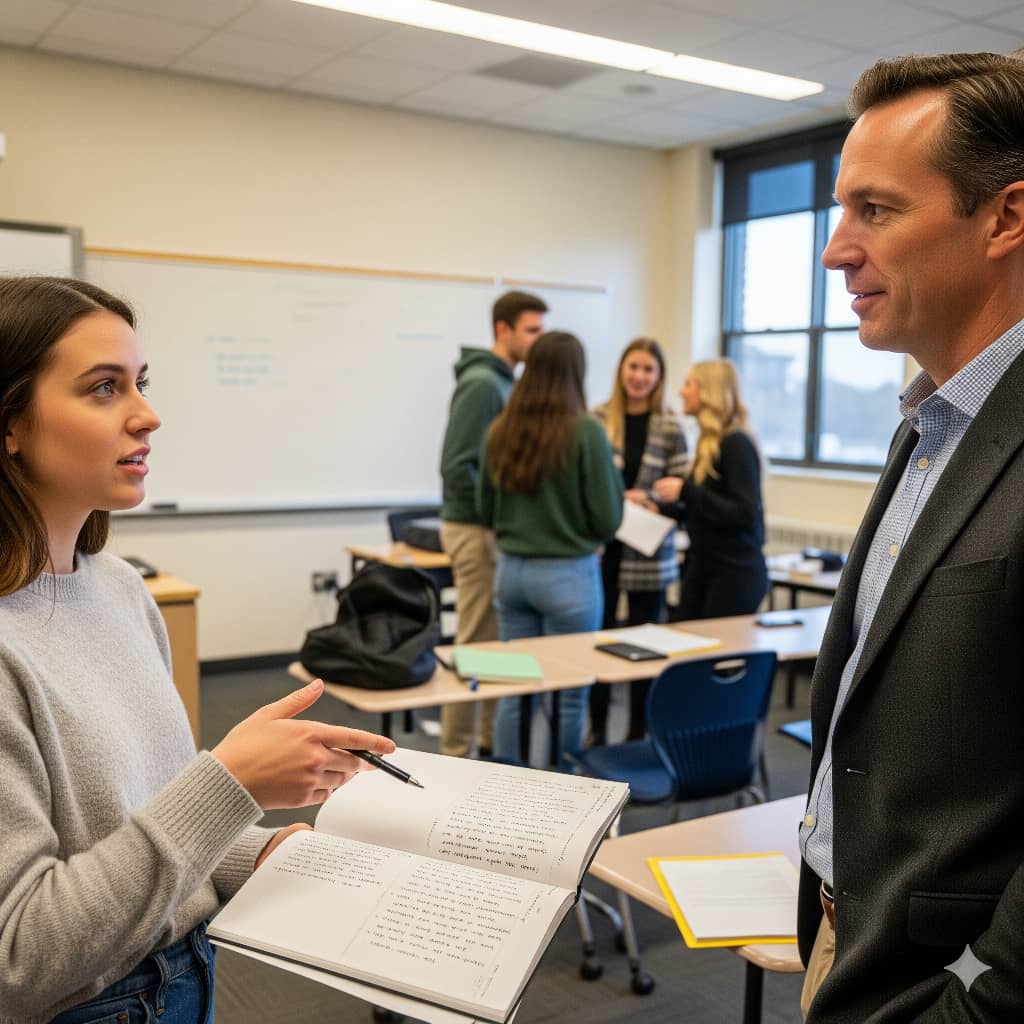Guest speakers transform MBA learning from theoretical to practical. Discover how to maximize these opportunities for networking, insight, and career advancement. The first time I watched a Fortune 500 CEO struggle to explain their company’s failed product launch to our MBA class, I understood something no case study could ever teach: leadership isn’t about having all the answers, it’s about how you navigate not having them. As the CEO detailed the painful months of recovery, the organizational changes, and the personal doubt they’d overcome, the classroom felt different. We weren’t students analyzing historical business scenarios; we were witnesses to raw, contemporary leadership in action. That’s the power of guest speakers in an MBA program: they bring textbooks to life with the bruises and wisdom of real experience.
Guest speakers serve as living case studies, bridging the gap between academic theory and business reality. Where our operations management textbook explained lean manufacturing principles, the automotive executive showed us photos of factory floor changes that saved millions. Where our finance professor taught discounted cash flow models, the private equity partner shared how they’d walked away from a technically “profitable” acquisition because the human dynamics felt wrong. These speakers didn’t contradict our academic learning; they contextualized it, showing where formulas were effective and where they fell short in the face of the complexities of human realities.
The most valuable lessons often came during Q&A sessions. I learned to listen not just to the answers, but to how speakers responded to challenging questions. Did they become defensive? Did they admit uncertainty? Did they reframe the question to reveal deeper insights? One technology founder, when asked about his biggest mistake, spent twenty minutes detailing a hiring error that nearly sank his company, then concluded: “I’m not here to impress you with my successes. I’m here to help you avoid my failures.” That humility and generosity changed how I view leadership more than any lecture ever could.
Preparation separates passive observers from active participants. Early on, I’d show up to speaker sessions. Now, I research their company’s recent earnings reports, read their interviews, and prepare specific questions that show genuine engagement. This preparation led to a conversation with a retail CEO about her expansion strategy that turned into a summer internship opportunity. Another classmate’s thoughtful question about corporate social responsibility resulted in a personal invitation to visit the speaker’s manufacturing facility. These moments don’t happen by accident—they happen when you treat speaker sessions not as lectures, but as conversations.
The diversity of perspectives matters as much as the individual insights. In one week, we might hear from a Silicon Valley disruptor advocating “move fast and break things,” followed by a century-old family business leader discussing “slow and steady values.” This exposure to contradictory approaches teaches nuanced thinking far better than any single philosophy could. I began keeping a journal comparing how different leaders approached similar challenges, their varying risk tolerances, communication styles, and decision-making frameworks. This comparative analysis became one of my most valuable learning tools.
Networking with speakers requires a strategic approach rather than opportunism. Instead of jostling for handshake time with everyone, I focus on making genuine connections with speakers whose paths align with my interests. The follow-up matters more than the initial meeting: a thoughtful email referencing specific points from their talk, a connection on LinkedIn with a personalized message, or sharing an article relevant to our discussion. These curated relationships have led to mentorship opportunities, project collaborations, and job referrals that mass networking never would have produced.

Some of the most memorable speakers weren’t the famous names, but the unconventional voices—the ethicist who made us debate AI morality frameworks. The journalist explained how media narratives shape consumer behavior. Even the former politician who described legislative impacts on business in ways no corporate executive could. These peripheral perspectives often provided the most creative insights, enabling us to view business challenges through wider lenses.
The classroom itself transforms during visits from speakers. I’ve watched normally disengaged students lean forward intently when hearing firsthand accounts of startup failures. Theoretical debates suddenly became practical when speakers described actual boardroom conflicts. Watched professors skillfully connect speaker anecdotes to course concepts, creating learning moments that resonated emotionally and intellectually. These sessions remind everyone why we chose business school: not just to learn about business, but to prepare for authentic leadership in the business world.
The benefits extend beyond graduation. Speaker insights become part of your professional vocabulary and decision-making framework. Years later, I still find myself recalling a manufacturing executive’s advice about “listening to the factory floor” when facing operational challenges, as well as a marketing leader’s caution about “data blindness” when analyzing customer metrics. These aren’t abstract concepts anymore; they’re lived wisdom from people who’ve been there.
Perhaps the most outstanding value lies in humanizing success. Seeing leaders acknowledge their struggles, doubts, and failures makes ambitious career paths feel more attainable. Their stories become personal roadmaps showing that success isn’t linear—it’s messy, iterative, and often born from setbacks. This perspective alleviates the pressure of perfectionism and fosters the resilience necessary for effective leadership.
Your MBA program’s guest speakers offer more than entertainment or networking opportunities; they provide windows into the realities you’re preparing to face. Their stories, questions, and even their silences teach lessons no textbook can capture. The students who thrive aren’t necessarily the ones with the highest grades, but those who lean in closest when these visitors speak because sometimes the most critical learning happens between the lines.
References
Garvin, D. A. (2024). Guest speakers in the classroom. Harvard University, Office of the Vice Provost for Advances in Learning. Guest discussions allow students to contextualize leadership behaviors and provide authentic insights from decision-makers, enhancing understanding of managerial realities (Harvard University)
Pepple, D. G., et al. (2023). Utilizing Guest Lectures to Enhance Student Employability: Pedagogical Considerations. Studies in Higher Education, 48, 350-370. This study develops a framework based on self-determination theory to maximize the impact of guest lectures on student employability by linking theory and practice through carefully selected industry experts (Pepple et al).
Mayer, R. (2022). Guest speakers: Linking industry and academia. Engineering Professional Centre. Guest lectures serve as a bridge between academic learning and industry insights, improving student engagement and collaboration between universities and the private sector (Mayer)
Machingambi, S. (2007). The use of guest speakers, company visits, and professional events in the curriculum. Journal of Marketing Education. This research shows that guest speakers contextualize theory through real-life examples, improving students’ understanding in business education (Machingambi) [

